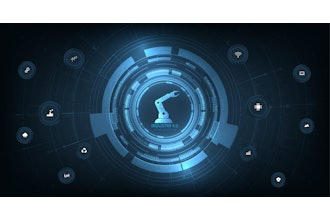
The resurgence of nearshoring and reshoring has dispersed electronics manufacturing facilities across the globe. Heavy reliance on digital platforms, coupled with the sensitive nature of data and intellectual property, has heightened the risk of cyberattacks within this sector. A recent report from the World Economic Forum’s Center for Advanced Manufacturing and Supply Chains states that heightened connectivity and data transparency have made manufacturing the most targeted sector for cyberattacks for three years in a row. It now accounts for 25.7 percent of attacks, with ransomware involved in 71 percent of these incidents.
Even a minor threat to security can set a company back exponentially, with cyber attacks causing hours of downtime and resulting in profit loss. Statista reports cybercrime costs in the United States reached an estimated $320 billion as of 2023. This dynamic is expected to continue, reaching approximately $1.82 trillion in cybercrime costs by 2028. This makes maintaining and managing the cyber ecosystem, and choosing the right partners, even more critical for companies that rely on electronics manufacturing.
Data and IP Protection
Data and IP protection take on many forms in this hyperconnected environment. Investing in data encryption offers key benefits such as:
- Protecting design files and customer information.
- Ensuring transaction details are securely transmitted.
- Mitigating the risk of eavesdropping and man-in-the-middle attacks.
- Building systemic resiliency by design to secure the most valuable assets of innovators.
While safeguarding profit is a key consideration for any electronics manufacturing organization, IP protection extends well beyond financial security. Developing an IP strategy tailored to the company’s goals, product lifecycle and market dynamics creates long-term resiliency.
A Multi-Faceted Approach to Data Security
Electronics manufacturers, as well as those in other sectors, should use a multi-faceted data security approach. This includes encryption, access controls, compliance with international standards, continuous monitoring, regular security audits and employee training. A trusted advisor can guide manufacturers when developing their data security initiatives and ease the burden in case of cyberattacks.
The more platform security measures the better; however, there are several initial measures manufacturers should consider when choosing an external resource and developing and implementing a data security plan.
- Choosing an external provider for electronics manufacturing. The right partner can maximize both security and efficiency in the manufacturing process. Alongside security and efficiency, electronics manufacturers gain much better visibility on their supply chain. An external platform gives manufacturers real-time information on where their components are in the production and delivery cycle, guarantees the authenticity and quality of materials, and gives a holistic look at the state of their inventories.
- Implement robust platform security measures. Security shouldn’t stop at two-factor authentication. Look for a partner equipped with multiple platform security measures and commits to continually improving their security strategies. Data encryption is another key tool that ensures sensitive data such as design files, customer information and transaction details are securely transmitted over the internet, mitigating the risk of eavesdropping and man-in-the-middle attacks. Encrypting data at rest assures that sensitive information, such as customer designs and personal information, is inaccessible even if the physical storage is compromised.
- Security incident and anomaly detection. Continuously monitoring platforms for unusual activity or security incidents is essential. Manufacturers should consider a partner that utilizes machine learning algorithms. These algorithms can detect abnormal behavior, such as unusual login patterns, API usage or data access patterns. Detecting these risks could indicate a security incident, enabling manufacturers to take steps to secure their data and begin their recovery processes.
- The right partner offers proactive measures for data security, alongside support and resources outside of company hours in case of emergency. It’s also key to carefully vet suppliers to ensure adherence to security standards. This includes evaluating their security practices, compliance with regulations and ability to safeguard sensitive data. This makes certain that the manufacturer’s supply chain upholds the same high standards of security.
- Incident preparation. Proactive responses like incident response planning and vulnerability assessments are ultimately better than responding to an active issue. Security should not be an afterthought or a “when we get to it” situation. Manufacturers can start the incident preparation process by building a response plan. Preparedness for an incident requires continuous monitoring and anomaly detection to catch threats sooner rather than later. But if an incident occurs, procedures such as notifying customers, relevant stakeholders and employees can further safeguard company assets. Employee training and awareness campaigns are also critical to ensure all members of the company are on the same page when it comes to the importance of IP and data security.
Safeguarding the Future
Electronics manufacturers must continually adapt to stay ahead of emerging threats. Developing robust IP and data protection strategies, and partnering with a trusted advisor committed to staying at the forefront of security best practices is no longer a nice-to-have - it’s a must-have to address evolving threats and bad actors. Investing in data and IP protection safeguards the future of both manufacturers and businesses that depend on their reliable output.



















